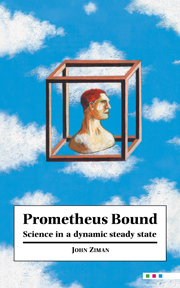Book contents
- Frontmatter
- Contents
- Preface
- 1 What is happening to science?
- 2 Scientific and technological progress
- 3 Sophistication and collectivization
- 4 Transition to a new regime
- 5 Allocation of resources
- 6 Institutional responses to change
- 7 Scientific careers
- 8 Science without frontiers
- 9 Steering through the buzzword blizzard
- Further reading
- Index
2 - Scientific and technological progress
Published online by Cambridge University Press: 05 August 2012
- Frontmatter
- Contents
- Preface
- 1 What is happening to science?
- 2 Scientific and technological progress
- 3 Sophistication and collectivization
- 4 Transition to a new regime
- 5 Allocation of resources
- 6 Institutional responses to change
- 7 Scientific careers
- 8 Science without frontiers
- 9 Steering through the buzzword blizzard
- Further reading
- Index
Summary
Aladdin rubbed the lamp. There was a great clap of thunder. A giant Genii appeared out of a cloud of smoke. ‘Greetings, Master!’ said the Genii, ‘Thy every wish is my command.’
The unabdated advance of knowledge
The origins of our science and technology lie in the mists of antiquity. Most of the essential features of the present way of doing science were already established in seventeenth- century Europe. People such as Isaac Newton and Anton van Leeuwenhoek devoted their lives to observation, experiment and theory, and contributed their discoveries to a common pool of knowledge. Institutions such as universities, academies, learned societies, and scientific journals provided the means by which scientists could publicly recognize or criticize each other's work. The knowledge acquired by research could thus be tested, consolidated and made the basis for further advances.
The systematic accumulation of knowledge by this process has been going on for more than three centuries. We look back now in astonishment at how far we have come. How exciting it must have been to hear for the first time about the spiral galaxies, the age of the dinosaurs, the germs that carry disease, or the atomic nucleus. In all that time, there has been no significant break in the history of science as a human undertaking. Scientists still celebrate the lives of their great predecessors almost as if they were former colleagues – earlier members of the firm, now regrettably retired and, alas, passed on.
- Type
- Chapter
- Information
- Prometheus Bound , pp. 17 - 42Publisher: Cambridge University PressPrint publication year: 1994



